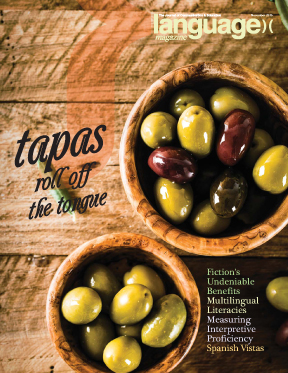All Language Learning Is Critical
Nearly every educational commentary, report, or study published over the last few years seems to stress the importance of 21st-century learning skills, but few are specific as to what these skills actually are and how our students can acquire them. What is clear, however, is that research has shown that learning a second language bestows benefits that tally very closely with these skills.
Pearson published a report last year entitled “Exploring the Learning Curve,” which examined the changing skill needs for students globally, based on the idea of a “Global Index of Cognitive Skills and Education Attainment [which] compares the performance of 39 countries and one region (Hong Kong) on two categories of education: cognitive skills and educational attainment. The index provides a snapshot of the relative performance of countries based on their education outputs.”
While international comparisons of educational attainment are only useful when other key factors like poverty and diversity are taken into account, the report contains a list of “eight skills for the future student” which compartmentalize the 21st-century skills called for by so many different organizations into the following: leadership; digital literacy; communication; emotional intelligence; entrepreneurship; global citizenship; problem-solving; and team-working.
Examining these skills individually creates an undeniable argument in favor of mandatory second-language learning from early grades.
Leadership requires a whole range of skills but rests on the key element of understanding what people want and explaining how your goals can complement theirs. “There is a rising need for people skilled in understanding context that stems from how people speak or interact. This goes beyond issues of inclusiveness and having a culturally diverse workforce. It is much more an issue of leadership in being about to comprehend and hold different perspectives readily and why people may think in different ways,” argues Rawn Shah on Forbes.com. Leadership is “about choosing the right words for creating understanding and alignment… Being able to connect and inspire people through your words is of paramount importance when building a new company, or bringing together any group of people around a collective purpose,” adds Silicon Valley entrepreneur and founder of Alynd, Chris Heuer. There’s considerable crossover here with entrepreneurship, where languages are especially helpful in enabling businesspeople understand markets and see opportunities early.
Digital literacy can be defined as the ability to locate, organize, understand, evaluate, and analyze information using digital technology, and the link between it and language learning is so clear that most digital-literacy programs are managed by language faculties at the higher-education level.
Although there is no necessary relationship between emotional intelligence and a cognitive ability like language learning, the cultural awareness that comes with multilingualism leads to greater emotional understanding.
Nearly every month, a new study is published linking multilingualism to improved cognition, and most of these improved levels of cognition are measured by improved problem-solving skills.
This leaves us with communication skills, team-working, and global citizenship, where the benefits derived from learning another language are obvious.
Now that the American Academy of Arts and Sciences (AAAS) has formed a Commission on Language Learning, a national effort to “examine the current state of U.S. language education, to project what the nation’s education needs will be in the future, and to offer recommendations for ways to meet those needs,” let’s hope that policymakers will recognize the embedded benefits of language learning in the acquisition of 21st-century learning skills.
Visit our website and click on Resource to find links to the research used here in support of language learning.
IN THIS ISSUE:
Fact or FICTION: The PLOT thickens Stephen Krashen argues that self-selected pleasure reading of fiction is key to complex text comprehension for first- and second-language learners
Skills for a Multilingual, Global Learning Community Edynn Sato offers educators strategies to help multilingual learners develop academic literacies
Transforming Teaching Harvard white paper analyzes teaching problems and suggests a ‘system’ to build teachers’ expertise
Listen and Read to Achieve Erwin Tschirner explains the rationale behind an important new study
Spanish Vistas Students share their diverse experiences of Spain
South America’s City of Light Buenos Aires, the Paris of the South makes a fascinating Spanish immersion destination
Last Writes Richard Lederer celebrates 150 years of a Wonderland of words



